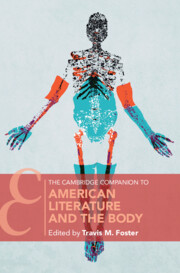Book contents
- The Cambridge Companion to American Literature and the Body
- The Cambridge Companion to American Literature and the Body
- Copyright page
- Contents
- Contributors
- Chronology of Publications and Events
- Acknowledgments
- Introduction
- Part I Genres
- Part II Critical Methodologies
- 9 Feminist Theory, Feminist Criticism, and the Sex/Gender Distinction
- 10 Reading Bodies and Textual Materialities
- 11 How to Read Disabled Bodies in History
- 12 How to Read Disabled Bodies Now
- 13 Health Humanities, Illness, and the Body in American Literature
- 14 The Indigenous Body in American Literature
- 15 The Black Body and the Reading of Race
- 16 Ecocriticism and the Body
- Further Reading
- Index
- Cambridge Companions To …
10 - Reading Bodies and Textual Materialities
from Part II - Critical Methodologies
Published online by Cambridge University Press: 30 July 2022
- The Cambridge Companion to American Literature and the Body
- The Cambridge Companion to American Literature and the Body
- Copyright page
- Contents
- Contributors
- Chronology of Publications and Events
- Acknowledgments
- Introduction
- Part I Genres
- Part II Critical Methodologies
- 9 Feminist Theory, Feminist Criticism, and the Sex/Gender Distinction
- 10 Reading Bodies and Textual Materialities
- 11 How to Read Disabled Bodies in History
- 12 How to Read Disabled Bodies Now
- 13 Health Humanities, Illness, and the Body in American Literature
- 14 The Indigenous Body in American Literature
- 15 The Black Body and the Reading of Race
- 16 Ecocriticism and the Body
- Further Reading
- Index
- Cambridge Companions To …
Summary
Reading “leaves no trace; its product is invisible,” or so Susan Stewart argues in On Longing, theorizing reading as an immaterial activity of the mind, implicitly divorced from the body.1 Sometime in 1865, as the Civil War was drawing to a close, Emily Dickinson came to a different conclusion in a short poem contesting such an ethereal conception of reading. The poem rehearses, rather cryptically, a scenario that had become tragically familiar in many households on both sides of the conflict, the reading of a letter announcing a soldier’s death and the devastating grief that the news of this loss caused in the surviving relatives.
- Type
- Chapter
- Information
- The Cambridge Companion to American Literature and the Body , pp. 150 - 164Publisher: Cambridge University PressPrint publication year: 2022
- 2
- Cited by

